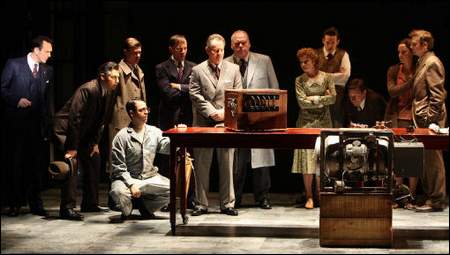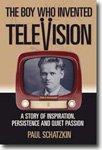
We've got a picture!
- September 7, 1927
- as portrayed in The Farnsworth Invention
Is there a place for "history"
in an "historical drama"?
This is the question that will confront audiences as they watch
The Farnsworth Invention, the new play written by Aaron Sorkin
that opens tonight at the Music Box Theater on 45th Street.
As the descriptor "historical drama" implies, The Farnsworth
Invention is based on a true story. In a nutshell: The title
character, Philo T. Farnsworth was a 14 year farm boy tilling a field
in Rigby Idaho in the summer of 1921 when he figured out how to bounce
electrons back-and-forth in a vacuum tube -- the key to the invention
of television. In 1927 he produced a working model of his concept.
In 1930 he obtained a critical patent. He spent the balance of the
1930s fighting with RCA over the ownership of that patent.
Therein lies a modern-day "David and Goliath" story. The
historical record of Farnsworth -v- RCA reads just like the Biblical
version, with David defeating the giant. But in the play, Goliath
wins.
"Goliath" in this case takes the form of David Sarnoff
-- the ambitious president of RCA who was determined that his company
alone would deliver television to the marketplace. To that end, he
obtained the services of an engineer named Vladimir Zworykin, who
also had some ideas for an electronic television system.
In order to compress this decades-long drama into just a couple of
hours of stage time, playwright Sorkin is understandably forced to
make choices about which events or characters to include, which to
compress or compile, and which to omit. The audience can only hope
that the writer's choices ultimately serve the underlying truth of
the actual events.
The issue then, boils down to "which actual events is a dramatist
entitled to change?"
If a writer crosses the line from "dramatic license" to
actually altering the underlying facts to suit his dramatic purpose,
has he gone too far? At what point does the alteration of the facts
in the service of the underlying truth actually alter the truth itself?
I think it is arguable that The Farnsworth Invention crosses
that line.
At the heart of this debate is a line of dialog in the penultimate
scene. It is a courtroom drama -- the kind of situation that a previous
Aaron Sorkin play handled masterfully, as anybody who has seen Jack
Nicholson's final speech in A Few Good Men will readily attest.
But in this case, Sorkin is dealing with historically documented litigation.
He doesn't have the luxury of rendering whatever verdict suits his
dramatic purpose.
In the final decision in Interference #64,027, delivered in July
of 1935, the patent examiners concluded: "priority of invention
is awarded to Philo T. Farnsworth." So it is simply wrong for
the judge in the play to announce that "priority of invention
is awarded to Vladimir Zworykin."
Thus Farnsworth is portrayed as losing litigation that he actually
won. Now, it may seem petty to judge an otherwise outstanding and
successful production on the falsity of a single line, but the point
is not minor.
As the "Sarnoff" character in the play states, RCA was
created to "collect patent royalties, not pay them" and
for more than a decade RCA steam-rolled over the entire radio industry.
But Philo Farnsworth persevered and prevailed. His victory in 1935
made him the first independent inventor to successfully withstand
RCA's juggernaut.
But you will not learn that from sitting through The Farnsworth
Invention.
The playwright has argued that this is drama, not journalism. But
this is a unique kind of drama: it is, supposedly, not entirely fiction.
Most of the people in the audience for this production will be hearing
the name "Philo Farnsworth" for the first time in their
lives -- despite the countless hours of their lives they will spend
in the presence of his invention. One would hope that the impression
they come away with of the title character is a reasonable representation
of the actual man and his actual story.
But this Philo Farnsworth is portrayed as "an alcoholic loser"
(as one blogger concluded) who cannot find a solution to his technical
challenges in the laboratory.
Nobody denies that Philo Farnsworth self-medicated at certain times
in his life. But halfway through the first act he is seen proposing
to his wife while drunk. This is an absolute impossibility in Mormon-dominated
1920s Provo, Utah.
And the manner in which the play addresses Farnsworth's technical
achievements reduces 'a breakthrough of epic proportions' to an insurmountable
"light problem." But those who worked closely with Farnsworth
knew him as a uniquely inspired source of countless original ideas.
Many of his innovations found their way into the camera tubes -- like
the Image
Orthicon -- that ultimately made television the ubiquitous appliance
that it is today.
These unflattering themes help to drive the drama to its ultimately
false conclusion: the court room
scene is followed by another in which Sarnoff and Farnsworth meet.
The key line in this (admittedly fictional) encounter is Farnsworth's
lamentation that he's "just lost television."
The point may be true, given the fading light of history. But had
such a scene actually occurred in 1935 -- if the real Philo Farnsworth
had met the real David Sarnoff in the moments after the decision was
rendered in the pivotal litigation -- then the scene would have been
very different from what is portrayed here. Rather than his moment
of defeat, this was Farnsworth's moment of triumph and Sarnoff's defeat.
Rather than the play's Sarnoff charitably imploring Farnsworth to
come to work for RCA, the real David Sarnoff would eventually agree
to pay Farnsworth at least $1-million in patent royalties, making
Farnsworth the first independent inventor ever paid a dime by RCA.
All of which begs the question: why is it necessary to make things
up out of whole cloth - or, worse, to reverse an actual legal verdict
-- when the real story is so compelling?
--Paul Schatzkin
--December 3, 2007




